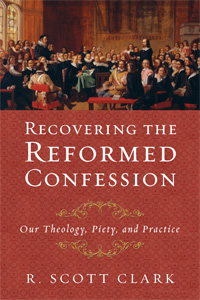I don’t know what’s in your garage, but from time to time mine has become pretty cluttered and stuff has to be pitched. What we keep and what we pitch says something about us. People have theological garages too, in which they . . . Continue reading →
John Frame
A Very Brief Response to John Frame’s Review of Recovering the Reformed Confession
John Frame has written a lengthy (20,000 words!) review of and response to Recovering the Reformed Confession. To put the size of the review into perspective, a typical book chapter is 10,000 words. I appreciate the detail of the review and, in general, . . . Continue reading →
Hart: It’s Not About Style
Darryl writes: “…pipe organs are no more beautiful than guitars, and upper-, middle-, and lower-class aesthetics have no standing in “traditional” Reformed worship. The reason has everything to do with the theology of the Lord’s Day, when Christians assemble with all the . . . Continue reading →
Lamenting Decline or Questioning Premises and Methods
It started with John Frame’s “Warrior Children” piece in 2003. In June, 2012 Anthony Bradley wondered about the decline of popular presbyterians. More recently Bill Evans has elaborated on the theme of the decline of conservative presbyterianism. This morning I wake to . . . Continue reading →
Everything Does And Does Not Come Down To Triperspectivalism
One final note: whether you think this is a really good systematic theology or one of the most important in the last generation or two, probably depends on how much you get into tri-perspectivalism. I have friends who find Frame’s triads of . . . Continue reading →
Should I Buy It?
Frequently I receive the question in my inbox: “Should I buy this book?” What I would like to say is, “Yes, buy every book but don’t buy every book you buy.” I think it is a good idea to own and read . . . Continue reading →
Heidelcast 57: Why We Can’t Move On (3)
Revisionism isn’t always a bad thing. I am a revisionist myself. I’ve been trying to help people see the history of Reformed theology rather differently from the way it was often presented from the middle of the 19th century through the 1970s. . . . Continue reading →
Helm Critiques Frame’s Perspectival Theism
In The Doctrine of God (2002) we find Frame discussing God’s relationship to time and space. (The sections are reproduced almost verbatim in Frame’s recently published doorstopper, his one volume Systematic Theology. (On God and time compare pages 557f. of The Doctrine . . . Continue reading →
Should I Buy It? A Book Review
Frequently I receive the question in my inbox: “Should I buy this book?” What I would like to say is, “Yes, buy every book but don’t buy every book you buy.” I think it is a good idea to own and read . . . Continue reading →
Of Nice And Men
In a recent foreword to a book advocating Norman Shepherd’s peculiar brand of covenant theology, John Frame attacks some of Shepherd’s critics as “stupid, irresponsible and divisive.” Apparently, someone complained about Frame’s lack of civility so he issued an apology that the . . . Continue reading →
Machen’s Warrior Children, Ed Stetzer, And Beth Moore
John Frame first published his essay “Machen’s Warrior Children” in 2003, in a Festscrhfit (a volume of congratulatory essays usually in honor of a 65th birthday or a retirement) for Alister McGrath. The essay was ostensibly a historical analysis of what happened . . . Continue reading →
Is Reformed Theology “Isolationist?”
One of the many criticisms John Frame makes of Recovering the Reformed Confession is that it advocates a closed, isolationist, elitist view of the Reformed faith in order to exclude others unnecessarily and wrongly.1 Jerry Owen, a commentator on Frame’s review, asks, . . . Continue reading →






